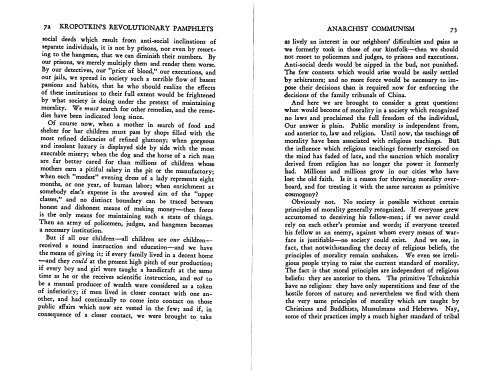Kropotkin's Revolutionary Pamphlets - Libcom
Kropotkin's Revolutionary Pamphlets - Libcom
Kropotkin's Revolutionary Pamphlets - Libcom
You also want an ePaper? Increase the reach of your titles
YUMPU automatically turns print PDFs into web optimized ePapers that Google loves.
7" KR.OPOTKIN'S REVOLUTIONARY PAMPHLETS<br />
ANARCHIST COMMUNISM<br />
socUl deeds which result from anti-social inclinations of<br />
separate individuals, it is not by prisons, nor even by resorting<br />
to the hUlgmen, that we can diminish their numbers. By<br />
our prisons, we merely multiply them and render them worse.<br />
By our detectives. our "price of blood," our executions, and<br />
our jails. we spread in society such a terrible flow of basest<br />
passions and habits, that he who should realize the effects<br />
of these institutions to their full extent would be frightened<br />
by w?at society is doing under the pretext of maintaining<br />
moraltty. We must search for other remedies, and the remedies<br />
have been indicated long since.<br />
Of course now, when a mother in search of food and<br />
shelter for her children must pass by shops filled with the<br />
most refined delicacies of refined gluttony; when gorgeous<br />
and insolent luxury is displayed side by side with the most<br />
execrable misery; when the dog Uld the horse of a rich man<br />
are far better cared for than millions of children whose<br />
mothers earn a pitiful salary in the pit or the manufactory;<br />
when each "modest" evening dress of a lady represents eight<br />
months, or one year. of human labor; when enrichment at<br />
somebody else's expense is the avowed aim of the "upper<br />
classes," and no distinct boundary can be traced between<br />
honest and dishonest means of making money-then force<br />
is the only means for maintaining such a state of things.<br />
Then an army of policemen, judges, and hangmen becomes<br />
a necessary institution.<br />
But if all our children-all children are our childrenreceived<br />
a sound instruction and education-and we have<br />
the means of giving it; if every family lived in a decent home<br />
:-<br />
and they could at the present high pitch of our production;<br />
If every boy and girl were taught a handicraft at the same<br />
time as he or she receives scientific instruction, and not to<br />
be a manual producer of wealth were considered as a token<br />
of inferiority; if men lived in closer contact with one another,<br />
and had continually to come into contact on those<br />
public affairs which now are vested in the few; and if, in<br />
consequence of a closer contact, we were brought to,. take<br />
as lively an interest in our neighbors' difficulties and pains as<br />
we formerly took in those of our kinsfolk-then we should<br />
not resort to policemen and judges, to prisons and executions.<br />
Anti-social deeds would be nipped in the bud, not punished.<br />
The few contests which would arise would he easily settled<br />
hy arbitrators; and no more force would be necessary to impose<br />
their decisions than is required now for enforcing the<br />
decisions of the family tribunals of China.<br />
And here we are brought to consider a great question:<br />
what would become of morality in a society which recognized<br />
no laws and proclaimed the full freedom of the individual,<br />
Our answer is plain. Public morality is independent from,<br />
and anterior to, law and religion. Until now, the teachings of<br />
morality have been associated with religious teachings. But<br />
the influence which religious teachings formerly exercised on<br />
the mind has faded of late, and the sanction which morality<br />
derived from religion has no longer the power it formerly<br />
had. Millions and millions grow in our cities 'Who have<br />
lost the old faith. Is it It reason for throwing morality overboard,<br />
and for treating it with the same sarcasm as pcimitive<br />
cosmogony?<br />
Obviously not. No society is possible without certain<br />
principles of morality generally recognized. If everyone grew<br />
accustomed to deceiving his fellow-men ; if we never could<br />
rely on each other's promise and words; if everyone treated<br />
his fellow as an enemy, against whom every means of warfare<br />
is justifiable-n0 society could exist. And we see, in<br />
fact, that notwithstanding the decay of religious beliefs, the<br />
principles of morality remain unshaken. We even see irreligious<br />
people trying to raise the current standard of morality.<br />
The fact is that moral principles are independent of religious<br />
beliefs: they are anterior to them. The primitive Tchuktchis<br />
have no religion: .they have only superstitions and fear of the<br />
hostile forces of nature; and nevertheless we find with them<br />
the very same principles of morality which are taught by<br />
Christians and Buddhists. Mussulmans and Hebrews. Nay.<br />
some of their practices imply a much higher standard of tribal

















